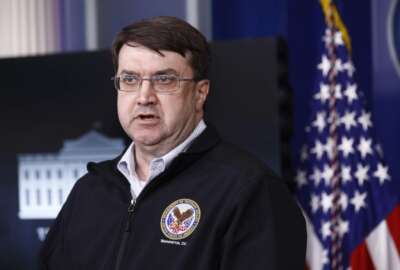
Veterans Affairs gives an update on its vaccine distribution efforts
In today's Federal Newscast, at least 132,000 health care professionals at the Department of Veterans Affairs have received the first dose of the COVID-19 vaccine.
To listen to the Federal Newscast on your phone or mobile device, subscribe in PodcastOne or Apple Podcasts. The best listening experience on desktop can be found using Chrome, Firefox or Safari.
- At least 132,000 health care professionals at the Department of Veterans Affairs have received the first dose of the COVID-19 vaccine. VA vaccinated an additional 14,000 veterans at high risk of getting the virus. The department will begin administering second doses to eligible employees this week. A total of 195 VA facilities now have the capacity to accept either the Pfizer or Moderna vaccines. VA has roughly 400,000 employees and 10 million veterans enrolled in its network.
- Roughly two-thirds of the investigative staff at the Justice Department said the pandemic has an impact on their ability to work cases. The finding comes from a survey of certain Justice employees about their experiences during the COVID-19 pandemic. A quarter of employees said their agency didn’t provide them with proper personal protective equipment needed for the job. Another 25% say they weren’t properly trained on how to use the equipment around members of the public. The Justice inspector general surveyed 6,000 employees last summer about their experiences.
- Federal employees who had to forfeit vacation time at the end of the year can hang on to a few more of those days. The Office of Personnel Management said a new, temporary annual leave policy is in effect. It allows federal employees to retroactively carry over up to 300 hours of vacation time instead of the usual 240 hours. Employees who do take advantage of the new policy can use the leave in 2021 only. It stems a provision in the annual defense policy bill that became law on New Years Day. (Federal News Network)
- The Government Accountability Office is turning 100 in July and the celebration already has begun. Congress created the Government Accounting Office in 1921 through the Budget and Accounting Act. Comptroller General Gene Dodaro said the initial focus on accounting grew to the current mission that is all about federal agency performance. GAO said its return on investment has averaged over the past four years $165 on every dollar invested in the agency. GAO said the financial benefits of its work in 2020 alone totaled $77.6 billion.
- A familiar voice in the field of federal services acquisition has a new perch. The former executive vice president and counsel at the influential Professional Services Council has two new jobs. Alan Chvotkin is now a partner at the law firm Nichols Liu, which specializes in government contractors. And he’s the president of a small publisher of federal contracting, cybersecurity and compliance information called PubK, which has two Nichols-Liu partners on its advisory board.
- The House passed a bill to make agency budget justification documents more accessible. Rep. Mike Quigley’s (D-Ill.) Congressional Budget Justification Transparency Act would require agencies to post these documents on a central searchable website in addition to on their own websites. The bill also tasks the Office of Management and Budget with keeping an updated list of agencies expected to submit budget justifications.
- Maybe the 117th Congress will be the year for one cybersecurity bill that has been languishing? The House passed the FedRAMP Authorization Act three separate times last year only for the bill to die in the Senate over last minute objections. The lower chamber approved Rep. Gerry Connolly’s (D-Va.) legislation yesterday as one of its first acts. The bill would not only codify the cloud security program, but aims to reduce duplication, require the General Services Administration to automate the evaluation processes and authorize $20 million in funding for FedRAMP. In fiscal 2020, FedRAMP saw a 50% increase in agencies reusing authorized cloud products.
- A bill strengthening the independence of agency inspectors general passes the House. The IG Protection Act would require agencies to notify Congress before any watchdog personnel changes. Rep. Ted Lieu (D-Calif.) introduced the bill. The legislation would also require the president to report to Congress if an IG hasn’t been nominated 210 days after the position becomes vacant. House Oversight and Reform Committee Chairwoman Carolyn Maloney (N.Y.) said the bill would address long vacancies in watchdog roles.
- The Environmental Protection Agency finalized a rule creating new requirements for research used to create agency regulations. The rule requires the EPA to give greater consideration to studies that release raw data sets it can independently review. The new rule focuses on dose response studies which look at how a person’s exposure to a substance correlates with health risks. The EPA proposed the rule in April 2018.
- President Donald Trump’s executive order banning certain kinds of diversity and inclusion training affected both federal employees and contractors. But when it comes to contractors, the Defense Department appears to have mostly ignored the order. The Pentagon’s inspector general looked at a sample of 21 contracts the military services issued after the order took effect, and found only two of them included the required language banning what the administration calls “divisive” training for contractor employees. DoD said the missing language was an oversight, and it’s now modifying the contracts. It’s unclear how much that will matter. Late last month, a federal judge issued a nationwide injunction barring the government from enforcing the order against contractors. And President-elect Joe Biden is expected to rescind the order entirely when he takes office later this month.
- The Navy is making it easier for sailors to pay tuition assistance debts. The service said it will now accept payments from debit cards and electronic fund transfers. Before this week, the Navy only accepted repayment of tuition assistance from cashier’s checks, money order or payroll deduction. The service said it has seen an increase in the use of tuition assistance since the beginning of COVID-19.
- The Marine Corps is making forays into the 5G world. At Marine Corps Air Station Miramar, life is a more advanced than other places in the nation. Six months ago, the base turned on its first 5G network. Over the next four months, it plans to turn on more nodes that will make its network more capable. The project is a collaboration between the Marines and Verizon. The military service plans to use 5G to take advantage of autonomous vehicles on base. It also wants to connect drones to the cellular service and use 5G to make the installation more energy efficient. (Federal News Network)
Copyright © 2025 Federal News Network. All rights reserved. This website is not intended for users located within the European Economic Area.
Eric White
Eric White is news anchor and Federal Drive producer at Federal News Network.
Follow @FEDERALNEWSCAST
Related Stories
IGs on pandemic oversight board warn job well done still means billions in fraud
Related Topics
5G
Alan Chvotkin
All News
annual leave
Benefits
Carolyn Maloney
Covid-19
COVID-19 vaccine
diversity equity inclusion and accessibility
Donald Trump
Environmental Protection Agency
Federal Drive
Federal Newscast
FedRAMP
Gary Peters
Gerry Connolly
Government Accountability Office
House Oversight and Government Reform Committee
Inclusion
Joe Biden
Justice Department
Marine Corps
Moderna
National & World Headlines
Office of Personnel Management
Pay & Benefits
Pentagon
personal protective equipment
Pfizer
Ted Lieu
Tom Temin
Verizon
Veterans Affairs
Workforce
workforce training




